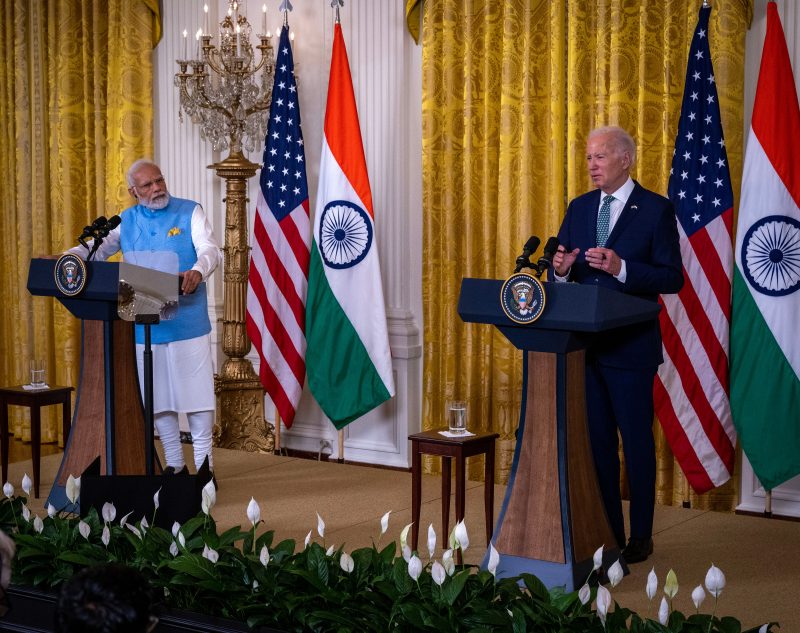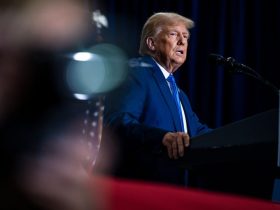Standing next to Indian Prime Minister Narendra Modi at the White House on Thursday, President Biden defended calling Chinese President Xi Jinping a “dictator” at a recent campaign event. And he went on to characterize the American relationship with Modi — who has been accused of aiding the erosion of democratic principles in India — as different from the one with Xi because India shares the same “democratic character” as the United States.
While delivering a speech at a fundraiser in California on Tuesday, Biden made what appeared to be an off-the-cuff comment about the February downing of a suspected Chinese surveillance balloon, suggesting that Xi had been kept in the dark about the balloon by his own government.
“That’s what’s a great embarrassment for dictators — when they didn’t know what happened,” Biden said.
While the implication that Xi is a dictator provoked a strong rebuke from China and spurred questions from the State Department about what comes next in U.S.-China relations, Biden said Thursday that he doesn’t think his words would have “any real consequence” on the relationship between the countries because he has long believed Xi is a dictator.
The president was asked why he doesn’t take the same tone with Modi, who has faced accusations of targeting religious minorities in India and leading a crackdown on dissent — claims that have come from members of Biden’s own party.
Biden said the U.S. relationship with China is very different from its connection with India because the United States and India are “both democracies” that share an “overwhelming respect for each other.”
“[There’s] a common democratic character in both our countries — our people, our diversity, our cultures are open, tolerant, [there’s] robust debate,” Biden said. “We believe in the dignity of every citizen.”
The president added that the whole world “has a stake” in the success of American and Indian democracies, which makes both nations “appealing partners and enables us to expand democratic institutions … around the world.”
Still, Biden did not address the concerns of human rights groups, lawmakers and scholars who have written open letters to the White House and published opinion pieces in American media outlets spotlighting the erosion of democratic principles in India on Modi’s watch.
Asked by reporters about what steps, if any, Modi and the Indian government are taking to uphold free speech and improve the rights of Muslims and other religious minorities in India, the prime minister pushed back.
Modi said he was surprised that people were raising these issues, arguing that democracy is a fundamental value in India and insisting that there is “absolutely no space for discrimination” in his government.
India, he said, has proved that “democracy can deliver.”
“And when I say deliver, this is regardless of caste, creed, religion, gender,” he said. “There’s absolutely no space for discrimination. And when you talk of democracy, if there are no human values, and there is no humanity, there are no human rights, then it’s not a democracy.”
Modi’s critics, however, have pointed to an increase in the persecution of India’s Muslim minority, the repression of journalists, the proliferation of bigoted rhetoric and attacks on freedom of speech since his rise to power in 2014. The State Department and several independent groups have highlighted such problems in reports and statements, saying the situation has grown worse in recent years.
In an open letter sent ahead of Modi’s visit, more than 70 members of Congress urged Biden to use his meeting with the Indian leader to address political violence, internet shutdowns, restrictions on press freedom and other “troubling signs” in the world’s largest democracy.
Since Modi first came to power, India has increasingly resembled an autocracy, according to independent groups such as the V-Dem Institute at the University of Gothenburg in Sweden, which monitors democracies around the world.
Modi and his party have been accused of oppressing opposition leader Rahul Gandhi, who in March was removed from Parliament and disqualified from elections after he mocked Modi at a political rally. He also faced possible imprisonment. Modi’s government has also asked that social media giants Twitter and Facebook remove links to a BBC documentary exploring Modi’s role in the Gujarat riots.
Researchers have also pointed to a rise in the persecution of the country’s Muslim minority — including vigilante killings of Muslim men accused of slaughtering cows or dating Hindu women. HindutvaWatch.org, a site that tracks real-time data sets of human rights abuses in India, has, since its founding in April 2021, catalogued more than 1,000 instances of violent attacks and rhetoric against religious minorities and members of lower-ranked castes in the country.
On Thursday, Biden said he and Modi had “good discussions about democratic values” and that the two are “straightforward with each other.”
Toluse Olorunnipa, Ellen Nakashima, Gerry Shih, Abigail Hauslohner and Pranshu Verma contributed reporting.








